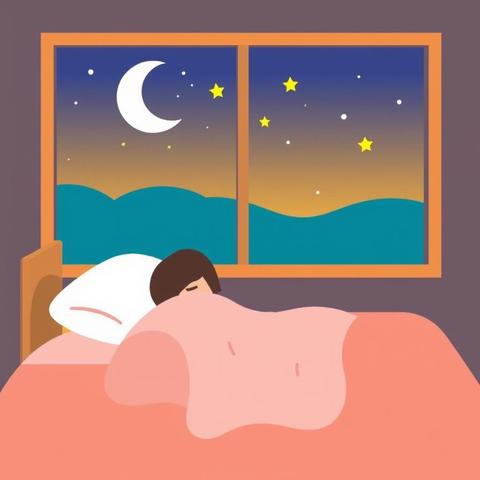Have you ever plummeted from a great height in your dreams, only to jolt awake with a gasp, heart pounding? The sensation is jarring, the memory vivid. For many, this experience of falling dreams and the accompanying hypnic jerks – those sudden muscle twitches that often precede or accompany them – sparks a mixture of fear and confusion. What do these unsettling nocturnal events mean? Are they a sign of something deeper? This article delves into the fascinating world of falling dreams and hypnic jerks, exploring their potential meanings, offering practical strategies to improve sleep, and illuminating the profound emotional and psychological benefits of understanding your dreams.
The Science Behind Falling Dreams and Hypnic Jerks
Falling dreams, often accompanied by the involuntary muscle spasms known as hypnic jerks, are remarkably common. While the exact cause isn’t fully understood, prevailing scientific theories point to a neurological explanation. As we drift off to sleep, our brains transition through various sleep stages. During this transition, our bodies experience a natural relaxation, sometimes accompanied by a sudden shift in brain activity and muscle tone. This involuntary muscle spasm—the hypnic jerk—is thought to be a response to this physiological shift. Our brain, still partially active, interprets this sudden relaxation as a sensation of falling, triggering the vivid dream.
The Role of the Nervous System
The process involves the interplay of several neurological systems, including the brainstem, which regulates vital functions, and the nervous system’s control over muscle tone. The abrupt change in bodily sensations, from a state of relative tension to sudden relaxation, can easily be misconstrued by the dreaming mind as a fall.
Variations in Experience
Not everyone experiences falling dreams or hypnic jerks with the same intensity. Some individuals might only experience a mild twitch, barely registering it as a dream, while others might experience a terrifying plunge followed by a jolt so powerful that they wake up in a state of heightened anxiety. This variation reflects individual differences in sleep cycles, sensitivity to sensory input, and underlying stress levels.
The Hidden Meanings Behind Falling Dreams
While the physiological explanation helps understand how hypnic jerks and falling dreams occur, it doesn’t fully address why they happen. Dream analysis offers valuable insights into the potential psychological and emotional underpinnings of these experiences. Often, falling dreams are not merely a random neurological event; they can symbolize a sense of loss of control, insecurity, or a feeling of being overwhelmed in waking life.
Loss of Control and Insecurity
The feeling of falling in a dream often reflects a feeling of losing control or being unsupported in one’s waking life. This could manifest in various areas: career anxieties, relationship troubles, financial instability, or even simple feelings of inadequacy. The dream acts as a symbolic representation of these underlying fears and anxieties.
For example, Sarah, a client of Dream Therapy Now, frequently dreamt of falling from high cliffs. Through our sessions, we discovered that her dreams reflected her anxieties about her new job and the pressure to perform. The height represented the significant challenges she felt she was facing, and the feeling of falling mirrored her fear of failure.
Overwhelm and the Need for Grounding
Falling dreams can also symbolize feeling overwhelmed or disconnected from one’s grounding in life. This can manifest as a feeling of being “out of your depth” or lacking a firm sense of self. The dream may be a subconscious call for a reassessment of priorities, a need for greater self-care, or a reminder to focus on the present moment.
Spiritual Interpretations
Some spiritual perspectives interpret falling dreams as a symbolic journey into the subconscious. The act of falling might represent a descent into the depths of the self, a necessary process of releasing old patterns or beliefs that no longer serve the individual. The waking jolt could then represent a sudden awakening to a new truth or understanding.
Common Variations and Themes in Falling Dreams
The specific details within a falling dream can significantly impact its interpretation. For instance:
- The height of the fall: A fall from a low height might indicate minor anxieties, whereas a fall from a great height could represent more significant challenges or deeper insecurities.
- The environment: Falling into water might symbolize an emotional cleansing or letting go of past traumas. Falling into darkness could represent a fear of the unknown or a loss of direction. Falling onto soft ground might indicate support or a safe landing.
- The emotions experienced: The feelings associated with the fall—terror, helplessness, exhilaration—provide valuable clues to the underlying emotional context.
The Interpretation and Deeper Message of Falling Dreams

To gain a deeper understanding of your falling dreams, consider these questions:
- What aspects of your waking life feel precarious or out of control? Identifying these areas allows for targeted self-reflection and potential solutions.
- What supports are missing in your life? The dream might be highlighting a lack of emotional, social, or practical support.
- What needs to be released or let go of? The feeling of falling can symbolize the need to release negative emotions, limiting beliefs, or unhealthy patterns.
Remember, dream interpretation is a deeply personal process. What one symbol means for one person may differ for another. Keeping a detailed dream journal and reflecting on the emotional context of the dream can be incredibly insightful.
Practical Advice for Dreamers

Here are some actionable steps you can take to process your falling dreams and gain deeper insights:
- Keep a Dream Journal: Record your dreams immediately upon waking, noting details like the environment, emotions, and any significant symbols.
- Reflect on Your Waking Life: Connect your dreams to recent events, relationships, or stressors in your life. Are there any recurring themes or patterns emerging?
- Practice Mindfulness and Meditation: These practices can help to reduce stress and anxiety, which can contribute to unsettling dreams.
- Seek Professional Guidance: If falling dreams are causing significant distress or impacting your sleep quality, consider seeking support from a dream therapist or mental health professional. Dream Therapy Now offers expert dream analysis and personalized guidance to help you unravel the deeper meanings of your dreams.
Improving Sleep Quality: Strategies to Reduce Hypnic Jerks

While falling dreams and hypnic jerks are often benign, consistent disruptions to sleep can negatively impact your overall well-being. Here’s how to improve your sleep quality:
- Establish a Consistent Sleep Schedule: Go to bed and wake up at the same time each day, even on weekends, to regulate your body’s natural sleep-wake cycle.
- Create a Relaxing Bedtime Routine: Engage in calming activities like reading, taking a warm bath, or listening to soothing music before bed.
- Optimize Your Sleep Environment: Ensure your bedroom is dark, quiet, and cool.
- Limit Screen Time Before Bed: The blue light emitted from electronic devices can interfere with sleep.
- Get Regular Exercise: Physical activity can improve sleep quality, but avoid intense workouts close to bedtime.
- Manage Stress: Practice stress-reduction techniques like yoga, meditation, or deep breathing exercises.
- Review Your Diet and Caffeine Intake: Avoid large meals, caffeine, and alcohol close to bedtime.
The Emotional and Psychological Benefits of Dream Therapy
Understanding your dreams can be profoundly empowering. Through dream analysis, you can gain valuable insights into your subconscious mind, identify unresolved emotional issues, and work towards personal growth and transformation. Dream therapy provides a safe and supportive space to explore these deeper meanings, fostering self-awareness and emotional healing.
The Role of Dream Analysis in Fostering Personal Growth
Dream analysis offers a unique pathway to self-discovery. By deciphering the symbolic language of your dreams, you can unlock hidden potential, resolve conflicts, and cultivate a stronger sense of self. This journey of self-exploration can lead to greater emotional intelligence, improved relationships, and a more fulfilling life.
Conclusion
Dreams of falling and hypnic jerks, though initially unsettling, can be valuable windows into our subconscious minds. By understanding their potential meanings and employing practical strategies to improve sleep quality, you can transform these seemingly negative experiences into opportunities for self-discovery and personal growth. At Dream Therapy Now, we specialize in helping individuals understand and interpret their dreams through expert analysis, sleep science, and therapeutic practices. Let us guide you on your path to clarity, transformation, and a more restful, meaningful life. Contact us today at info@dreamtherapynow.com to schedule a consultation.
Dive into our blog to discover a wealth of content that will illuminate the significance of your nocturnal adventures and guide you through the labyrinth of dream symbolism. Impeccable Dream hopes this guide was helpful! If you want to see other blog posts about Dreams About Falling, here are some that may be of interest to you.